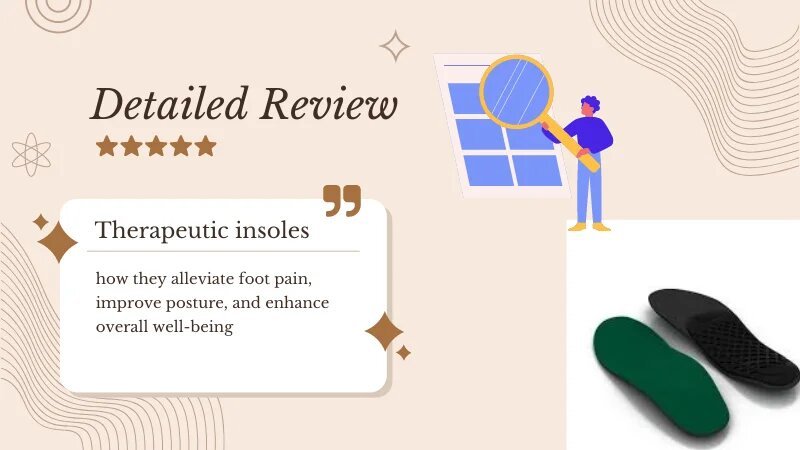
Therapeutic Insoles: A Path to Pain Relief and Comfort
Customized insoles can right now be seen as one of the most useful cures for foot pain and trouble. They are not only the cushion for your feet but they are more than that, as they give specific support to the sore parts. In this post, I will explain what therapeutic insoles are, how they can aid you, and how you can find the best one for you.
What Are Therapeutic Insoles?
Customized shoe insoles are shoe inserts used in the management of one or several foot complaints. While traditional insoles are designed simply to provide cushioning for the feet, therapeutic insoles have the purpose of addressing specific biomechanical abnormalities and pain. These insoles are commonly used by healthcare for various issues such as plantar fasciitis, flat feet, and arthritis.
Benefits of Therapeutic Insoles
Alleviation of Foot Pain
Using therapeutic insoles is one of the most common reasons that is recommended to get rid of foot pain. Heel pain and bunions are some examples of diseases that can cause a great amount of pain. Cortical insoles offer the necessary support to remove pressure from tender parts to alleviate pain.
Improved Posture
Your feet – they are the ground & the base of the entire structure of your body. If they are arranged inappropriately, then it leads to improper posture and backache problems. They assist in correcting your foot positions and this will automatically correct your total body posture. This alignment can help avoid more problems including knee and hip pain.
Enhanced Comfort
These insoles are aimed at treating medical conditions of the foot besides providing better comfort. There is comfort and protection from shock in every part because quality materials have been used in the manufacture of the shoes. This improves walking, standing, or running for it makes them comfortable no matter the state of their feet.
Prevention of Future Problems
The use of these insoles will also help you avoid future problems from rising on your feet. These insoles properly support and adjust to your feet to reduce foot issues and reduce the risks of getting plantar fasciitis or Achilles tendinitis.
Types of Therapeutic Insoles
Custom-Made Insoles
Prescribed therapeutic insoles are designed for a specific client. A healthcare provider will then make an imprint on your foot and your insoles will be custom-made to fit. These insoles are the best and most recommended for those with severe foot issues, or even those with foot complications. But they are often costlier than those available from retail stores without a doctor’s prescription.
Over-the-Counter Insoles
These insoles are obtainable for counter purchase in several sorts and grades. They are not individually shaped to fit the foot but they are cheaper than custom-made insoles and can be useful for those with mild to moderate foot disorders. Insoles are also available with varying levels of arch support and cushioning from many brands so you can always get the right one.
Gel Insoles
Gel therapeutic insoles are best known for their features such as high-density cushioning and shock protection. They are especially useful to wear by people who are required to sit for long periods. Gel material bears weight without focusing or aggravating pressure on the heel and ball of the foot. Gel insoles will be most useful to individuals who are disturbed by disorders such as heel pain or plantar pain.
How to Choose the Right Therapeutic Insoles
Identify Your Foot Type
The first way to choose the right therapeutic insoles is to understand your foot type. Planovalgus, pes cavus, or mesoarch: what type of feet do you have? It, therefore, looks compelling to have a clue about the type of feet you possess to choose the right insole that supports.
Consider Your Activity Level
Another criterion for your survival is your activity level in the water. Anyone involved in sports or any task that requires standing for long hours might benefit from having custom insoles designed for additional cushioning and shock absorbency. On the other hand, if you spend most of your time sitting down probably in an office setup, then a simple universal support insole might be adequate.
Consult a Healthcare Professional
If you have extremely painful feet or special medical conditions affecting your lower limb, it is recommended to seek out the advice of a healthcare provider if you are going to use therapeutic insoles. They can guide you on which type of insole is most beneficial to you and make sure you get maximal use out of them.
Caring for Your Therapeutic Insoles
Cleaning
This is well understood when you are seeking to continue making use of your insoles since cleaning them is vital. Nearly all insoles should be cleaned using a wet wipe and gentle soap. Remember not to submerge them in water as the materials used may get spoiled.
Replacing Insoles
The shoes also come with insoles, but these are destined to wear out and will require replacement. In general, replacement is recommended at least once in one year or half a year if used intensively. Indications that your insoles must be replaced are any signs of cushioning loss, physical wear, or reduced comfort.
Storing Insoles
When the insoles are not in use they should be kept in a cool dry place. They should not be exposed to very hot or cold temperatures, for dangerous heat can fasten the decay of the materials used.
Common Conditions Treated by Therapeutic Insoles
Plantar Fasciitis
Therapeutic insoles are often used in treating plantar fasciitis, which is one of the most common conditions of the toes. It also supports the ideal stepping, and soft cushioning to reduce force on the plantar fascia as a way of improving the condition a person is feeling.
Flat Feet
The disorders of flat feet can cause foot pain or improper posture if not treated properly. These insoles are ideal for flat feet and ascertain the necessary support for arching these absents to eliminate these ailments. They assist support the overall weight on the foot and marginally transfer pressure off the arch.
Arthritis
By arthritis, there is usually stiffness and pain at multiple joints in the foot. Comfort can be achieved, and shock will be absorbed by therapeutic insoles. They minimize the stress on the joints, which makes walking less stressful.
Diabetic Foot Problems
People suffering from diabetic diseases are more likely to suffer from foot diseases due to the flow of blood and nerves. Diabetic insoles are special ones that have increased thickness than normal insoles for extra cushioning and to minimize friction with the bottom of shoes that could lead to ulcers.
Conclusion
Therapeutic insoles are an effective aid for people experiencing foot problems of any kind. They afford specific assistance, correct positions, and increase general well-being. In regards to both custom-made and off-the-shelf insoles, the correct fit can change a person’s life. Uncomfortable shoes and foot pain are things that nobody wants to deal with, but with proper insoles and appropriate care, these problems can be avoided.


